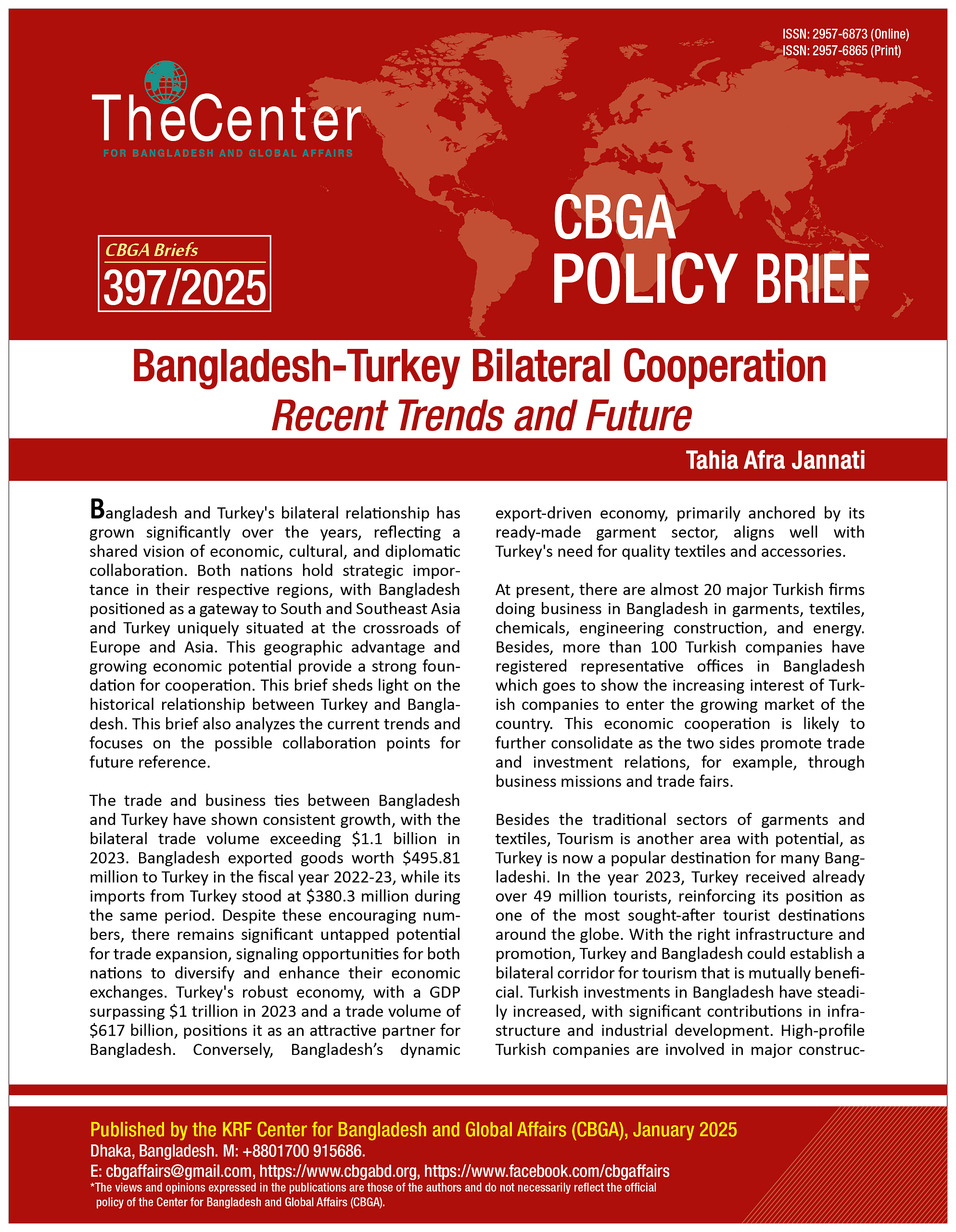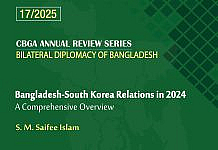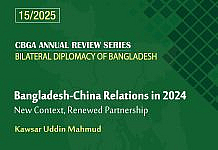
Bangladesh and Turkey’s bilateral relationship has grown significantly over the years, reflecting a shared vision of economic, cultural, and diplomatic collaboration. Both nations hold strategic importance in their respective regions, with Bangladesh positioned as a gateway to South and Southeast Asia and Turkey uniquely situated at the crossroads of Europe and Asia. This geographic advantage and growing economic potential provide a strong foundation for cooperation. This brief sheds light on the historical relationship between Turkey and Bangladesh. This brief also analyzes the current trends and focuses on the possible collaboration points for future reference.
The trade and business ties between Bangladesh and Turkey have shown consistent growth, with the bilateral trade volume exceeding $1.1 billion in 2023. Bangladesh exported goods worth $495.81 million to Turkey in the fiscal year 2022-23, while its imports from Turkey stood at $380.3 million during the same period. Despite these encouraging numbers, there remains significant untapped potential for trade expansion, signaling opportunities for both nations to diversify and enhance their economic exchanges. Turkey’s robust economy, with a GDP surpassing $1 trillion in 2023 and a trade volume of $617 billion, positions it as an attractive partner for Bangladesh. Conversely, Bangladesh’s dynamic export-driven economy, primarily anchored by its ready-made garment sector, aligns well with Turkey’s need for quality textiles and accessories.
At present, there are almost 20 major Turkish firms doing business in Bangladesh in garments, textiles, chemicals, engineering construction, and energy. Besides, more than 100 Turkish companies have registered representative offices in Bangladesh which goes to show the increasing interest of Turkish companies to enter the growing market of the country. This economic cooperation is likely to further consolidate as the two sides promote trade and investment relations, for example, through business missions and trade fairs.
Besides the traditional sectors of garments and textiles, Tourism is another area with potential, as Turkey is now a popular destination for many Bangladeshi. In the year 2023, Turkey received already over 49 million tourists, reinforcing its position as one of the most sought-after tourist destinations around the globe. With the right infrastructure and promotion, Turkey and Bangladesh could establish a bilateral corridor for tourism that is mutually beneficial. Turkish investments in Bangladesh have steadily increased, with significant contributions in infrastructure and industrial development. High-profile Turkish companies are involved in major construction projects, including bridges, energy plants, and urban development initiatives. These projects not only contribute to Bangladesh’s economic growth but also demonstrate the reliability of Turkish expertise in infrastructure development. Bangladesh has reciprocated by encouraging Turkish businesses to explore opportunities within its Special Economic Zones (SEZs). These zones, designed to attract foreign investment, offer a conducive environment for industries such as manufacturing, technology, and renewable energy. Both nations have emphasized the importance of creating high-tech products and developing tourism infrastructure to bolster their economic partnership.
In recent years, defense ties between Bangladesh and Turkey reached a new height with Turkey becoming an important supplier of defense technology and technical know-how. The Turkish defense industry, achieved yet another feather in its hat, with the successful first flight of its fifth-generation fighter jet KAAN. This achievement is a reflection of Turkey’s capabilities and also emphasizes Turkey’s prospects as a strategic defense partner for Bangladesh. Bangladesh is also reported to be interested in purchasing Turkish defense assets, including drones and naval systems, for the enhancement of its armed forces. The importance of such collaboration is that it not only enhances bilateral relations but also creates opportunities for both parties for joint production and transfer of technologies in the defense sector.
Between these two countries, cultural relations remained the most significant aspect of their bilateral relations. This was captured by Kazi Nazrul Islam, Bangladesh’s national poet, who admired the Turkish leader Kemal Ataturk, and the connection began in the early 20th century. This historical relationship still exists today and is manifested in her people’s growing passion for Turkish films and television dramas. Educational cooperation has also flourished, with Turkey offering scholarships to Bangladeshi students, fostering academic exchange and people-to-people connections. These initiatives create a deeper understanding and strengthen ties between the two nations.
When it comes to dealing with humanitarian issues, Turkey has always been a reliable partner for Bangladesh. The biggest area of Turkish support in humanitarian issues has been the Rohingya crisis. The Turkish Cooperation and Coordination Agency (TIKA) for years has provided large sums of aid, which has been used to solve many crises such as housing, healthcare, sanitation, and education for the Rohingya community, and recently pledged to continue doing so. This support highlights Turkey’s steadfast commitment when it comes to assisting Bangladesh. The Rohingya displacement is one of the biggest humanitarian crises of the century and Turkish support holds huge significance for Bangladesh. Bangladesh has always tried to return this favor by showing support and solidarity to Turkey during its time of need, most notably after the devastating earthquake in 2023. Both nations should consider expanding the spectrum of their trade not only to garment and machinery but also to other sectors such as information technology, renewable energy, and agro-products. Turkish capitalists may consider venturing into Bangladesh’s growing market, in particular, high-tech industries, green energy, and logistics. Joint campaigns to develop tourism in the two countries may contribute greatly to the cultural exchange and economic relations. The strategic relationship will be further consolidated by deepening defense ties through joint ventures and technology transfer. As countries that are both susceptible to climate change, Bangladesh and Turkey will likewise be able to work together on issues such as disaster management as well as renewable energy and sustainable development strategies.
Turkey and Bangladesh have evolved over recent years and established a broader partnership that spans integration with trade, defense, culture, and humanitarian aid. Given their strategic locations and economic potentials, both countries are well positioned to act as bridges for the trade and business between Europe and South Asia as well as South East Asia. The aspirations for joint prosperity founded on common values, coupled with the strategic partnership, solidifies the Bangladesh-Turkey relations.
– Tahia Afra Jannati is a Research Intern at the KRF Center for Bangladesh and Global Affairs (CBGA).







